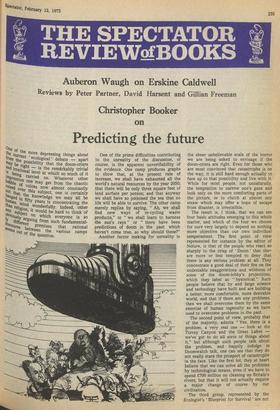Christopher Booker on
Predicting the future
9rie of the more depressing things about ;Ile tr current ' ecological' debate — apart orn the possibility that the doom-criers May be right — is the remarkably trivial and irrational i level at which so much of t 1.8 being carried on. Whatever other !inpression one may get from the chaotic ?Dabble of voices now almost constantly raised over this subject, one is certainly lot that the knowledge we may all be halged in fifty years is concentrating the tan mind wonderfully. Indeed, other a au religion, it would be hard to think of 4:1O ,Y subject on which everyone is IVIUsly arguing so li. di ff from such fundamental -erent premises that rational ses—Urse between the various camps erDs out of the question. One of the prime difficulties contributing to the unreality of the discussion, of course, is the apparent unverifiability of the evidence. One camp produces graphs to show that, at the present rate of increase, we shall have exhausted all the world's natural resources by the year 2050; that there will be only three square feet of land surface per person; and that anyway we shall have so poisoned the sea that no life will be able to survive. The other camp merely replies by saying, " Ah, we shall find new ways of re-cycling waste products," or "we shall learn to harness the sun's rays" or " there have been predictions of doom in the past which haven't come true, so why should these?"
Another factor making for unreality is the sheer unbelievable scale of the horror we are being asked to envisage if the doom-criers are right. Even for those who are most convinced that catastrophe is on the way, it is still hard enough actually to face up to that possibility and live with it. While for most people, not unnaturally, the temptation to narrow one's gaze and look only on the more comforting parts of the picture, or to clutch at almost any straw which may offer a hope of escape from disaster, is irresistible.
The result is, I think, that we can see four basic attitudes emerging to this whole matter, and which of the four we choose for ours very largely to depend on nothing more objective than our own individual temperament. The first point of view represented for instance by the editor of Nature, is that of the people who react so sharply to the cries of ' Doom' that thel, are more or less tempted to deny that there is any serious problem at all. They concentrate a good deal of their fire on the undeniable exaggerations and wildness of some of the doom-lobby's projections, which they label as "hysterical." Such people believe that by and large science and technology have built and are building a better, more comfortable, more desirable world, and that if there are any problems, then we shall overcome them by the same exercise of human ingenuity as we have used to overcome problems in the past. The second point of view, probably that of the majority, admits "Yes, there is a problem, a very real one — look at the Torrey Canyon and the Great Lakes — we've got to do all sorts of things about it," but although such people talk about the problem, and happily indulge in Doomwatch talk, one can see that they do not really stare the prospect of catastrophe in the face. Like the first lot, they at heart believe that we can solve all the problems by technological means, even if we have to spend £700 million on cleaning up Britain's rivers, but that it will not actually require a major change of course by our civilisation.
The third group, represented by the Ecologist's Blueprint for Survival' are not only prepared to admit there is a problem — they know it and feel it almost every hour of the day. They really are looking catastrophe in the face. But they argue that it can still be averted so long as we make a major change of course. We shall not just have to spend money in order to curtail the consequences of the way of life we already have, but actually have to give up our present standard of living, if catastrophe is to be averted, and indulge in every kind of drastic measure, from masssterilisation and banning the motor car to the large-scale adoption of a simpler, agrarian way of life (pace Thoreau, Rousseau, Morris, Owen etc).
Then there is the fourth point of view, held perhaps by the smallest number since it is in many ways the least comfortable (at least without the support either of a metaphysical optimism or a Stoic philosophy), which says that we are indeed faced by the likelihood of catastrophe, and that there is very little we are likely to be able to do to prevent it. The chances that we will manage to effect a major change of course, when all our economies and social organisation are geared to pushing the thing further and further down the road to disaster, are remote. Of course there will be increasingly drastic attempts made to stave off disaster, but many of them will be even more horrible than the disease they are intended to cure, and will anyway, as we have seen from our experience with birth-control, have very little overall effect.
Which of these four points of view we adopt as our own, and consequently which of the evidence we choose to consider as valid, seems ultimately to depend, as I say, on individual temperament. But it is certain that the four points of view are irreconcilable, that it is this which makes for a great deal of the unreality of the debate at large, and that the confusion is likely to be heightened still further when we find fragments of all four points of view scattered together almost indiscriminately within the covers of the same book — as they are in this symposium of twenty-four interviews' originally broadcast on Radio Free Europe.
At first sight, the prospect of such a distinguished international group of scientists, planners and academics addressing themselves to the problem of man's future might seem a promising one. The contributors range from Professor Toynbee to Brian Aldiss, taking in Werner Heisenberg, Jacques Ellul, Dennis Gabor, Herman Kahn, Edward Goldsmith of the Ecologist, assorted French sociologists and goodness knows who else on the way. We are launched on a suitably grave note with an epigraph from Ford Madox Ford declaring in 1938 that "if this civilisation of ours is to be saved, it can only be saved by a change of heart in the whole population of the globe." And, despite one or two interviews, whose presence was presumably dictated more by the auspices under which the series was originally broadcast than by their contribution to the main theme (such as that on 'NATO and the Environment,' or the two outdated pieces on unrest among French and German students), the book is excellently edited by G. R. Urban, whose introduction and questions frequently betray a wider and deeper grasp of the issues at stake than do the replies of many of his contributors.
But again and again, we feel the scale of the problem under discussion to be so vast that (unaided, for that matter, by the amorphous nature of the radio interview) these distinguished minds simply give way under the strain. Many intelligent and interesting things are said in passing, as for instance by Philip Rieff or Maurice Cranston. But overall, such a morass of illfounded conjecture about the future leaves us with the sense that we are listening to nothing more impressive than a convention of Foulshams and Old Moores deliberating their almanac for the year 2000.
We find Professor Toynbee setting the tone, for instance, after a quite interesting historical ramble through some of the attempts made by past civilisations to 'stop history,' such as the Roman Emperor who apocryphally ordered the death of a man who had invented unbreakable glass because it would cause unemployment and riots among the glassmakers of Alexandria, by ending merely with the injunction that, if we are to avoid catastrophe, we must learn to 'master ourselves.'
Such vague moralistic warnings are sounded throughout the book. Jacques Ellul thinks we must just muddle forward, while bewaring of 'the tyranny of technique,' Michael Shanks, after extolling the virtues of growth and dynamism, ends with a ritual nod to the darker possibilities by declaring "I believe that society will learn to harness technology ... but it will only do so if we devote far more time than in the past to the study of people and society rather than the study of things. Otherwise, in mastering the universe, man may destroy himself, if not physically, then culturally and morally." Nigel Despicht conjectures that the real problem may be 'man's gluttony.'
Dennis Gabor comes nearest to admitting real pessimism, when he fears that "as always when there is a major turning point in history, change will only come after a major breakdown." This sort of willingness at least to hint at the possibility of catastrophe, alternates with wild optimism. So often the optimists on this subject, by their quite obvious desire to think wishfully (i.e. not to think at all) are infinitely more depressing than the blackest pessimists. For instance, we have Louis Armand bravely declaring "I am totally unpessimistic," and that he believes the swing towards unthinking tech nological exploitation is being reversed, but the only real evidence he adduces for this major change of heart by Western civilisation is that French parks now contain patches of green grass where once they would have had concrete.
Intellectually, much the best contribution is the exchanges between Urban and Erich Jantsch of the University of California.
Jantsch is actually prepared to make such statements as that " before we can talk about the future, we must have a clear view of what is wrong with the direction we have taken so far." "First it is that in many respects technologis; evolution has landed us up a blind alleYo'f Not only does he place a great manYco. the more familiar wishful-thinking sreto ments in perspective, but he faces UP man's infinite capacity for self-decepti°;Po His conclusion •is that, unless disaster be averted, the West will have to settlelaivl falling expectations, and that we ,sh„.' anyway have "a very hard row to n°ths'e But he does not run away from possibility of colossal disaster. It is perhaps no coincidence tile" no some ways the gloomiest (and yet h)raie means the most dispirited) of contributors, should also be the one "o! consistently draws on the widest frain'fot reference, displays the capacitY clearest thought, and generally takes reii largest and most rational view. Collette with Jantsch (and the editor himsenb remainder of the contributors, like rove be the larger debate, seem merely t° toying with the greatest problem We collectively face.











































 Previous page
Previous page